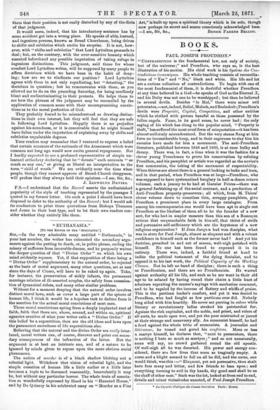" EUTHANASIA."
(TO THE EDITOR OF THE .` EPEOTATOR.1
SIR,—In the very admirable essay entitled " Euthanasia," in your last number, the writer has exhausted the secondary argu- ments against the putting to death, or, in polite phrase, ending the misery of sufferers from incurable disease, and he purposely waives the deeper question of that "Divine Order" on which his own mind evidently reposes. Yet, if that supposition of there being a "Divine Order" supplementary to the natural order, be rejected as the basis of moral argument, many other questions, set at rest since the days of Cicero, will have to be raked up again. Take, for instance, the preservation of sickly infants, the permanent marriage relation of ill-assorted couples, the safety from assassina- tion of tyrannical rulers, and many other similar problems.
Without for a moment denying that the natural order involves distinct moral laws, such as cover a large part of the sphere of human life, I think it would be a hopeless task to deduce from it the sanction for the actual moral convictions of most men.
Those moral convictions spring from a deeply implanted root of faith, faith that there are, above, around, and within us, spiritual agencies creative of what your writer calls a " Divine Order." if this belief be a superstition, then are the old ideas and laws upon the paramount sacredness of life superstitions also.
Believing that the natural and the divine Order are really inter- laced, moral writers can, of course, discover and point out secon- dary consequences of the infraction of the latter. But the argument is at best an intricate one, and of a nature to be ignored by minds given to repose upon the more obvious social phenomena.
The notion of murder is of a black shadow blotting out a celestial light. Withdraw that vision of celestial light, and the simple cessation of human life a little earlier or a little later becomes a topic to be discussed reasonably, benevolently it may be, but without any particular horror. The whole train of associa- tion so wonderfully expressed by Hood in his " Haunted House," and by De Quincey in his celebrated essay on " Murder as a Fine Art," is built up upon a spiritual theory which is its sole, though now perhaps its secret and scarce consciously acknowledged base.


































 Previous page
Previous page